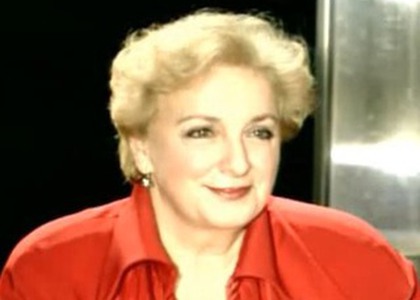> [Archived] Interviews

Interview with Ioana Ratiu Răileanu, daughter of maestro George Georgescu
On the occasion of the 60th anniversary of George Georgescu's death, the "George Enescu" Philharmonic dedicates the concerts on Thursday, January 11th and Friday January 12th, to the renowned conductor
On Thursday and Friday, January 11th and 12th, 2024, the "George Enescu" Philharmonic Orchestra will be under the direction of Cristian Măcelaru in a concert dedicated in the memory of George Georgescu, who was in charge of the Bucharest institution between 1920-1944 and 1954-1964. On this occasion, Ioana Rațiu Răileanu, the late maestro's daughter, spoke with Ioana Țintea
Mrs. Ioana Rațiu Răileanu, this year marks 60 years since your father, the reputed conductor George Georgescu, passed away. On this occasion, the institution he led for decades, "George Enescu" Philharmonic, dedicates two concerts of this week to maestro George Georgescu. What significance do these events have for you?
These events are of enormous importance and I am grateful to maestro Marin Cazacu, director of the philharmonic, who knows how to cultivate the memory and the values of Romanian music and had the initiative of this commemoration. He was fully supporting me. I thought it was an interesting opportunity, to be able to recall the key moment in my father's life and work by organizing an exhibition in the foyer of the Athenaeum. My intention was not easy to achieve, because choosing the essentials from a life so rich in concerts, festivals, operas and my archives being so wide, I had to concentrate the information in 15 panels covering a short biography: studies in Bucharest and Berlin, mentors , the Romanian philharmonic between '20 and '44 and '54-'64, the period when he was the general director and the abundant activity abroad, which is little known in Romania. Then, there are the three mandates as director of the Romanian Opera, almost ignored even in the Romanian opera. And the friendship with George Enescu, the young peoplehe encouraged and promoted, especially Dinu Lipatti and Valentin Gheorghiu and the end being his participation at the first Enescu festivals in '58 and '61. My message in favor of the creation of this exhibition is that George Georgescu devoted himself totally to the Romanian Philharmonic. For him it was like his own child and he wanted to bring it to excellence and international recognition, making the Philharmonic the brand of excellence of Romania.
On this occasion, a disc with recordings made by the Czech Philharmonic Orchestra conducted by George Georgescu produced by the Musical Publishing House is also being released. I would like you to give us more details about this album.
These recordings were made in the '50s by Supraphon Music Publishing House, with the Czech orchestra, soloist Valentin Gheorghiu. These recordings were re-released in 1999 in Paris by the Dante Lys Label and in the 2010s by Tobu Recordings for Japan. On the occasion of this concert, it is very important to have at least one of my father's discs present at the event. And then I decided to make known, for the first time in Romania, Beethoven's VII Symphony and the poem Death and Transfiguration by Strauss; the concerts with Valentin Gheorghiu, Liszt and Rachmaninov on the theme of Paganini being already published, but a reissue does not do less than to bring a remembrance of our great pianist. It is interesting to know that during this period, in the '50s, after his purge in '47, my father, George Georgescu, no longer had the right to conduct for life. Thanks to George Enescu, George Georgescu was only able to reconduct in 1947, in Romania. I mean, becoming general director again in 1954 until 1964, when he died. Extremely curious, he was allowed to honor contracts abroad, right from 1945. And in parallel with Romania he had concerts in Vienna, Berlin, in Florence at Maggio Fiorentino, at the Salzburg Festival and in Czechoslovakia among others. The successes of the concerts in Czechoslovakia led the record company Suprahon to offer him to record two CDs with the concerts given in Czechoslovakia, with him and Valentin Gheorghiu. I am very happy to be able to offer this disc to the Romanian public and to honor both my father and Valentin Gheorghiu.
Translated by Constantin Grigorescu,
University of Bucharest, Faculty of Foreign Languages and Literatures, MTTLC, year I
Corrected by Silvia Petrescu














